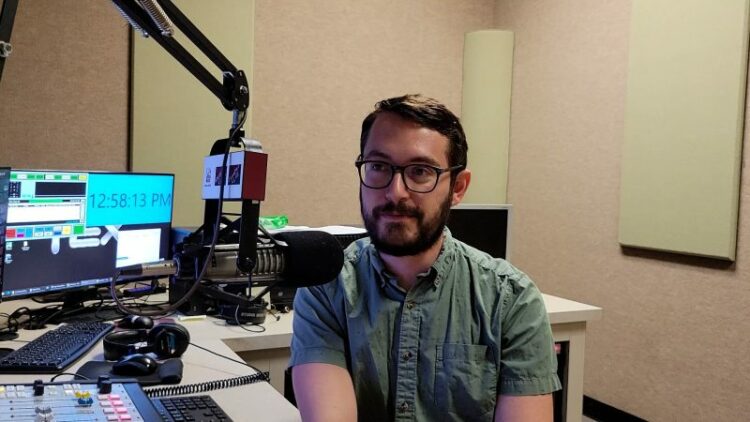In the run-up to the election, there is a lot of information out there on the internet, TV, radio, and other platforms; some of it is accurate and valuable, and some of it is not so much. One public media project seeks to discover what issues and concerns are most important to the communities of Arkansas, giving voters a voice in what gets coverage.
“The overall mantra of the whole project has been ‘Don’t assume that you know what’s best for people or don’t assume that you know what people are interested in,’” said Daniel Breen, news director at Little Rock Public Radio. “You have to get out of these four walls of the radio station to find out what your community needs from you as a public servant.”
America Amplified Initiative seeks to support community engagement in political reporting, especially in the election years. This year, the organization has expanded its partnerships to reach audiences in all 50 states, up from 30 stations in the 2022 midterm elections. According to its site, the group’s Election 2024 Initiative is supported by a $1.5 million grant from the Corporation for Public Broadcasting and a $250,000 grant from the Knight Foundation.
The organization reached out to Little Rock Public Radio about partnering to drive community engagement and get a better sense of the community in the Natural State. Each partner station is tasked with selecting a community of people to focus their efforts on. Inspired by Montana Public Radio’s 2022 coverage, the Little Rock station chose to narrow in on young and college-aged voters from around the state.
Funding for Little Rock Public Radio’s participation in the project came from the America Amplified Initiative.
“Young people are, it’s cliche to say, but they are the future,” Breen said. “And what they think, what’s important to them, will be what really drives elections going forward.”
Recently, Breen hit the road to visit college campuses in all corners of the state — Arkansas State University, ASU-Mountain Home, Lyon College, Hendrix College, Northwest Arkansas Community College and the tailgate party of the first Razorback game in Fayetteville. This week, he is working through the second section of schools, which consists of Arkansas Tech University, the University of Arkansas-Pine Bluff and the University of Central Arkansas. The original goal was to hit all the colleges and universities in the state, but the scope was reduced to a short representative list, and the smaller list of schools was split into two sections for logistical reasons.
In addition to the road trips, the station’s website features a portal for listeners to ask questions about the elections or questions that they would like radio reporters to ask candidates and lawmakers.
“It comes very naturally for us because we are on the UALR campus. We have a lot of partnerships with the School of Mass Communication; we have a ton of interns coming through here every semester,” Breen said. “More so than that, because we are a public media station, our model is somewhat unique in the journalism world. Like, we don’t have any corporate sponsors or anything like that; we really don’t have any reason not to base our coverage on what the community thinks because we’re a public service; we’re free for anyone. Again, there’s nothing else driving our coverage other than members of the community and what they want to hear.”
One of the biggest findings of the focus groups has been that the younger crowd is largely unconcerned about the “normal political topics” that are often reported in the media. Many of the young voters don’t care as much about statewide and federal races as they care about their “sense of place” and quality of life in their local communities.
“That is a little bit surprising to hear, but it does reflect what we’ve heard in statistics of why people aren’t engaged in the process,” Breen said.
Breen said it’s been “really heartening” to see that young voters have a deeper interest in local issues and matters and that he finds the media often overgeneralizes when they say the younger generations are not engaged in politics altogether.
The preparation for the project started last year with a few months of training, slowly rolling out the learned strategies over the past several months. After all the gathering of information is done, the team will report on stories that deal with the community’s concerns. Some of the interviewed young voters were recorded for their questions to be featured on upcoming broadcasts when their questions are answered.
The series of election-related coverage and candidate interviews will kick off soon and run for about a month until election day, Tuesday, Nov. 5. Election day will mark the end of this iteration of the project, but Breen said the skills and methods the team has learned along the way will inform the station’s coverage going forward as they seek to report news for and with the community rather than on it.
“That’s really going to give us a good foundation to go forward with that sort of community-focused lens for all of our reporting after that,” Breen said.
To listen to KUAR’s election coverage, tune in to 89.1 FM or visit https://www.ualrpublicradio.org/.
READ ALSO: I-30 Traffic Flow to Shift in Coming Months
Source link : http://www.bing.com/news/apiclick.aspx?ref=FexRss&aid=&tid=6705b4edaeae4cf893a8b6604f0b744c&url=https%3A%2F%2Farmoneyandpolitics.com%2Fpublic-radio-political-reporting%2F&c=14160115892269678297&mkt=en-us
Author :
Publish date : 2024-09-26 05:55:00
Copyright for syndicated content belongs to the linked Source.
